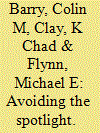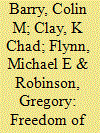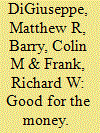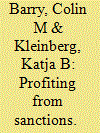|
|
|
Sort Order |
|
|
|
Items / Page
|
|
|
|
|
|
|
| Srl | Item |
| 1 |
ID:
123623


|
|
|
|
|
| Publication |
2013.
|
| Summary/Abstract |
Nonstate actors, such as international non-governmental organizations (INGOs) and multinational corporations (MNCs), have attained an increasingly prominent role in modern world affairs. While previous research has focused on these actors' respective interactions with states, little attention has been paid to their interactions with each other. In this paper, we examine the extent to which the decisions of private actors seeking to invest abroad are affected by the reputational costs of doing business in countries publicly targeted by human rights activists. We find that ''naming and shaming'' by human rights INGOs tends to reduce the amount of foreign direct investment received by developing states, providing evidence that INGO activities affect the behavior of MNCs. An additional implication of our findings is that shaming by INGOs can impose real costs on targeted states in the form of lost investment.
|
|
|
|
|
|
|
|
|
|
|
|
|
|
|
|
| 2 |
ID:
138301


|
|
|
|
|
| Summary/Abstract |
What determines the location of those human rights international non-governmental organization (INGO) resources found outside of the highly developed Western democracies? We draw a distinction between the bottom-up mobilization processes driving the location of human rights organization (HRO) members from the top-down strategic concerns driving where HRO leaders place permanent offices. In particular, we find that, while political opportunity structures generally increase the likelihood that a state has HRO members, it has a curvilinear influence on the number of HRO secretariats, which typically locate in areas seen as having a higher need for organizational resources. Further, while there is no clear connection between human rights abuses and HRO memberships in a state, HROs' strategic concerns lead them to place offices with reference to both local and neighborhood “need”—in other words, levels of repression.
|
|
|
|
|
|
|
|
|
|
|
|
|
|
|
|
| 3 |
ID:
134151


|
|
|
|
|
| Publication |
2014.
|
| Summary/Abstract |
Allowing or restricting foreign movement is a crucial policy choice for leaders. We argue that freedom of foreign movement reduces the level of civil unrest under non-democratic regimes, but only in some circumstances. Our argument relies on the trade-offs inherent in exit and voice as distinct strategies for dealing with a corrupt and oppressive state. By permitting exit and thereby lowering its relative costs, authoritarians can make protest and other modes of expressing dissatisfaction less attractive for potential troublemakers. Liberalizing foreign movement can thus function as a safety valve for releasing domestic pressure. But the degree to which allowing emigration is an effective regime strategy is shaped by the economic opportunities offered by countries receiving immigrants. We find that freedom of foreign movement and the existence of economic opportunities abroad reduce civil unrest in non-democratic states. However, at high levels of unemployment in the developed world, greater freedom of foreign movement actually increases protest.
|
|
|
|
|
|
|
|
|
|
|
|
|
|
|
|
| 4 |
ID:
113935


|
|
|
|
|
| Publication |
2012.
|
| Summary/Abstract |
Previous research indicates that a lack of state capacity is a key determinant of internal armed conflict. Scholars identify several internal dimensions of state capacity, but have yet to explore how international finance influences state resources. This is surprising because sovereign lending has increased dramatically in recent decades and plays an increasing role in the functioning of developed and developing governments. In this article, we explore this relationship between a state's integration into global credit markets and its subsequent capacity to promote domestic stability. We argue that international capital increases a state's ability to respond to internal opposition because states with favorable credit terms can expand their resource base beyond domestic constraints to deter, accommodate, or repress opposition while maintaining a level provision of resources to their political base. We examine the influence that both capital access and credit terms have on the risk of civil conflict in 141 countries from 1981 to 2007. Our empirical results indicate that states with affordable credit access are indeed less likely to experience civil conflict.
|
|
|
|
|
|
|
|
|
|
|
|
|
|
|
|
| 5 |
ID:
146144


|
|
|
|
|
| Summary/Abstract |
Scholarship on the determinants of foreign direct investment (FDI) flows has produced valuable insights into the role of host state characteristics and home-host relations. This study draws attention to another factor in investment decisions—the political and economic relations that home and host states maintain with third-party states. More narrowly, we focus on how investors respond to their home-state's imposition of economic sanctions against a trading partner. Greater economic integration has allowed states to use economic sanctions more frequently in recent decades. At the same time, economic sanctions are thought to have a distorting effect on global trade and financial flows as firms and governments adjust to new constraints. We argue that as firms at home in the sanctioning state respond to coercive measures against a trading partner by looking for alternative sources of profit, they will shift investments to states that can provide indirect access to the sanctioned economy. In particular, those states that are perceived as prospective sanctions-busters—major trading partners of the sanctions target or states with a history of sanctions-busting behavior—will benefit disproportionately from the misfortune of others. We test this conjecture using data on US economic sanctions and global flows of US FDI from 1966 to 2000. The findings reveal that investor decision making in part responds to political developments beyond the home-host dyad.
|
|
|
|
|
|
|
|
|
|
|
|
|
|
|
|
|
|
|
|
|